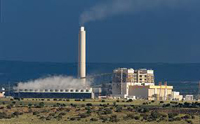Cronkite News
Debbie Padia’s hair salon eats up a lot of electricity and, with times being what they are, she has been closing the shop early when business was slow over the past year to save some money.
“It’s more economical to close early than to use all of the utilities all day,” Padia said of her shop in Benson. She fears what might happen if her electric bill went up even a little bit.
But a higher electric bill is exactly what critics say will happen if the Apache Generating Station and two other eastern Arizona power plants are forced to implement new pollution controls by the Environmental Protection Agency.
“The financial impact is huge,” said Geoff Oldfather, marketing manager for Arizona Electric Power Cooperative, which owns the Apache plant. “Would it shut us down? That is always a possibility.”
The cooperative estimates that it could cost up to $218 million to install the equipment the EPA is considering to cut down emissions of nitrogen oxide.
The other affected plants – the Coronado Generating Station near St. Johns and the Cholla Power Plant near Holbrook – estimate they could spend $110 million and $436 million, respectively, on the improvements.
But clean-air advocates say the costs need to be weighed against the 17,000 tons of pollutants that would be taken out of the air annually by implementing the regulations.
“For every dollar you spend on pollution control, you get about $10 in health benefits. That’s kind of the rule of thumb,” said John Thompson, an official with the Clean Air Task Force.
“How do you value a human life?” he asked.
The EPA held public hearings in late summer and is set to announce next month what improvements, if any, it will require at the three coal-fired power plants.
The agency proposed the new air-quality regulations to help improve visibility at 18 national parks in Arizona, New Mexico and Colorado – including the Grand Canyon – and to protect the health of people living in the region.
The EPA is reviewing public comments and is expected to make a final decision by Nov. 15, an EPA spokeswoman Margot Perez-Sullivan said. If mandated, each plant would have five years to implement the changes, she said.
Backers of the changes say excess nitrogen oxide emissions can become nitrate particles that people breathe in, leading to health problems.
“They’re associated with a range of respiratory problems and heart attacks,” said Daniel Lashof, the director of the climate and clean air program for the Natural Resources Defense Council. “In short, fine particles kill people.”
But power plant officials said the health threat is overstated.
“If this was a public health issue, we’d be looking at this differently,” said Ed Fox, Arizona Public Service vice president and chief sustainability officer. APS operates the Cholla plant.
Besides having no impact on public health, Fox said nitrogen oxide emissions have little effect on visibility.
Fox and officials from the other plants are primarily concerned with the cost of the changes, costs they say will have to be passed on to customers.
APS predicts residential customers would see about a $19 increase in their annual bill, while small-business bills would go up about $32 a year if new equipment is mandated.
“It will have an impact on the cost of electricity in Arizona,” he said.
Oldfather said the capital investment alone could force the Apache plant to shut down. That would mean the loss of 260 jobs around Benson, an area that’s already “economically depressed,” he said.
“Given the current state of the economy in this rural area especially, it would be devastating,” Oldfather said. “If you take away 260 sources of income in the community, you’re going to see a serious effect on the community.”
But Sandy Bahr, director of the Sierra Club’s Grand Canyon Chapter, said claims that plants might shut down is just a scare tactic.
“Since the Clean Air Act was passed (in 1970), the industry has been saying that it would go out of business – and it hasn’t,” she said.
Bahr said she believes “there is no right to pollute” national parks and that the EPA’s newly proposed requirements are long overdue.
“It’s like saying that Arizonans and people in the West don’t deserve clean air,” she said.
Thompson said that even when electricity costs go up for companies that have to make changes, they eventually stabilize.
“It’s one of those things where the rules are the rules,” he said. “If you’re not going to operate the plant cleanly, then you need to make some changes.”
But Rep. Paul Gosar, R-Flagstaff, said residents who turned out for a hearing his office hosted on the issue were clearly opposed.
“There was nobody in their public remarks that was in favor of these EPA rules,” said Gosar, who planned to send the EPA a video and transcript of the hearing. “Not one.”
Padia did not speak at the Gosar or EPA hearings, but has attended other meetings and testified about how many people the proposed regulations could affect.
“When it affects someone, it just trickles down and can affect three to five people in one situation,” she said.
She worries she could be one of those people and cringes at the prospect that it could force her to close her business.
“Oh my gosh… It’s that heartbreak of having a love that broke your heart,” she said of the business she’s been running 21 years. “It’s just that pain and that fear of what lies for tomorrow.”












